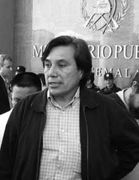For organized civil society in Guatemala, one cannot consider peace without a process of justice and reconciliation. Guatemala has recently been a focus of international attention due to the genocide case being tried in the Spanish National Tribunal against eight former Guatemalan civil and military officials. The PBI team has interviewed two human rights defenders who are working for justice and reconciliation: Feliciana Macario, in charge of the Victim Dignification Program of the National Council of Guatemalan Widows (CONAVIGUA), and Mario Minera, director of the Human Rights Legal Action Centre (CALDH). CALDH is the legal advisor of the Association for Justice and Reconciliation (AJR), an organization of witnesses and family members of victims that attempt to bring about justice through cases against genocide, a process that is taking years.
What does the process of reconciliation mean for you and your organization?
Feliciana: First of all, justice and the clarification of history are primary in bringing about reconciliation. After that we can think about democracy, development and true peace. There is a process to follow and we still have not completed all the steps. This process is really important for the families of the victims.
Mario: We have not reached the end result [of reconciliation] in Guatemala. What we have are individual, isolated steps: two reports of historical clarification on one side, several open judicial processes over here, economic reparations on the part of the state as consequences of the Inter-American Court of Human Rights (CIDH) rulings on another side [...] But right now there is no coherent process that one could call reconciliation.
What are the obligations of the state with respect to justice?
Mario: The state is obligated to try in court [the crimes committed during the armed conflict], not only because of the Peace Accords, but because the state, due to its political position since 1985, continues to reaffirm itself as a democratic state that respects the rule of law [...] One of the central elements of its functioning, therefore, should be justice.
The state is obligated to investigate, prosecute criminal actions and move towards an administrative justice system, not only for past crimes but those of the present. However, we find that the state does not comply with this [...] the system of justice and especially the Public Ministry continue without completing the functions that they are legally bound to do.
[...] Because of this, human rights organizations like CALDH are the groups that provide and carry out legal assistance to those involved in cases and, in certain instances, the investigation of what happened [...]. The systematization of this collection of information can involve risks to our security. It would be well worth running these risks if public prosecutors were continuing with investigations in the process of historical clarification, but we realize that this entity has done nothing.
Is the genocide case advancing on a national level?
Mario: We have an interesting phenomenon in Guatemala: in the year 2000 the legal case against genocide began. From 2000 to 2006 the Public Ministry did practically nothing to advance the investigation.
In October of 2006, AJR presented a petition calling for the first declaration to be taken from one of the accused state personnel. From there, two problems arose: the first was the use and abuse of appeals by the defence and the second were the excessive amounts of time needed to resolve such appeals by the Constitutional Court of Guatemala. These are two clear examples of the obstruction of justice.
What are the other obstacles in the judicial proceedings dealing with events of the armed conflict in Guatemala?
Feliciana: In the cases of human rights and genocide there is no willingness to completely carry out justice. I do not believe it is even permitted. In Guatemala, any judge or other functionary who wants to advance a case can be threatened or assassinated; for example, the death threats suffered by judge Cojulum, responsible for taking witness testimonies in the genocide case.
In spite of many years of waiting, there is still a lot of fear among the victims, but even more when they live amongst ex-military officers, ex-local troop member, ex-guerrillas, etc. In the process of carrying out exhumations we have had to get around a lot of obstacles. For example [...] in 2004 they threatened us, saying, […] “If you insist in taking out those bones from the graves, then take them. But don’t worry; yours are going to be there shortly”.
Are there cases against humanity or war crimes carried out on a national level?
Mario: There are a number of processes [...] that have lead to a sentencing; for example, there was a certain amount of success in the Dos Erres case in Peten. But later, at a national level, the case was compromised due to the use and abuse of appeals. We also have the case of Rio Negro. At a more local level and for very specific crimes, the first court case involving forced disappearance implicated military officer Felipe Cusanero Coj of Choatalu from Chimaltenango, in being the material author in the disappearance of three women and three men. The case advanced but has been stalled due to the fact that the state of Guatemala cannot charge a man for a crime that, at the time of the offence, was not defined by law.
What other procedures exist in order to try these cases?
Mario: Considering the malfunction of the justice administration system and the signing of the Peace Accords, the Inter-American System has started to be utilized. The Inter-American Human Rights Commission (CIDH) started to receive cases of forced disappearances, extrajudicial executions and also of cases involving labour violations because the national system [...] does not operate based on the law, in other words the cases were presented at the CIDH due to the denial of justice in Guatemala. The most disturbing case reported was that of a massacre, a result of the so-called Plan de Sánchez1. […] The CIDH has condemned the state of Guatemala for a number of cases [...]. For all the cases that have been tried the state has been asked to open national court cases in order to criminally prosecute the material and intellectual authors. For none of these cases has a national legal investigation been opened. The only part in which the state of Guatemala has complied is in material reparations, [...] which are important but totally insufficient, reducing the fight for justice to a material retribution.
What is your opinion of international conventions and judicial processes?
Mario: The Statute of Rome2 functions as a guarantee to avoid the repetition of these kinds of actions against humanity, in this way it is possible to judge continuing offences in the International Criminal Court.
The International Convention regarding Forced Disappearances reinforces the doctrine of universal jurisdiction for continuing offences [...] in other words; crimes that do not expire if the victim does not appear.
[…] The judicial process open in the Spanish National Tribunal is an example of the international criminal justice exercising universal jurisdiction and has made it possible for crimes against humanity and war crimes to be judged outside the country. From this angle the result is positive, already reflecting the fight against impunity and favouring the access to justice.
Feliciana: The act of giving testimonies has really generated many expectations for the families and the victims that have participated in the process. I have hope that the Spanish judge is able do what we cannot do here in Guatemala.

